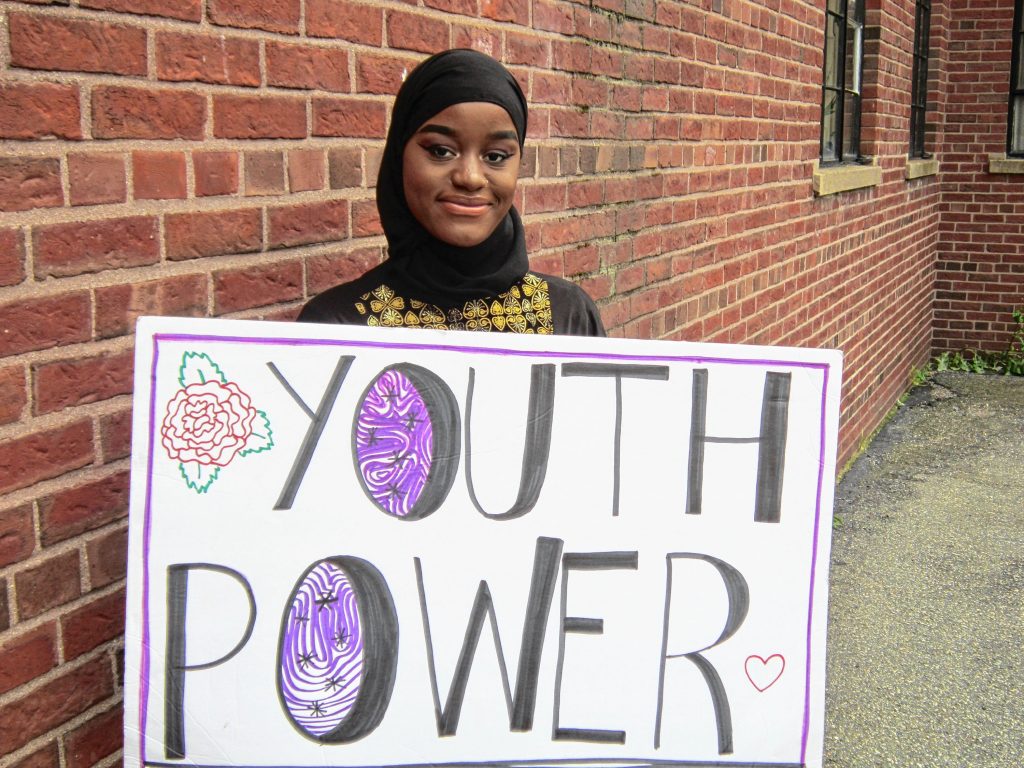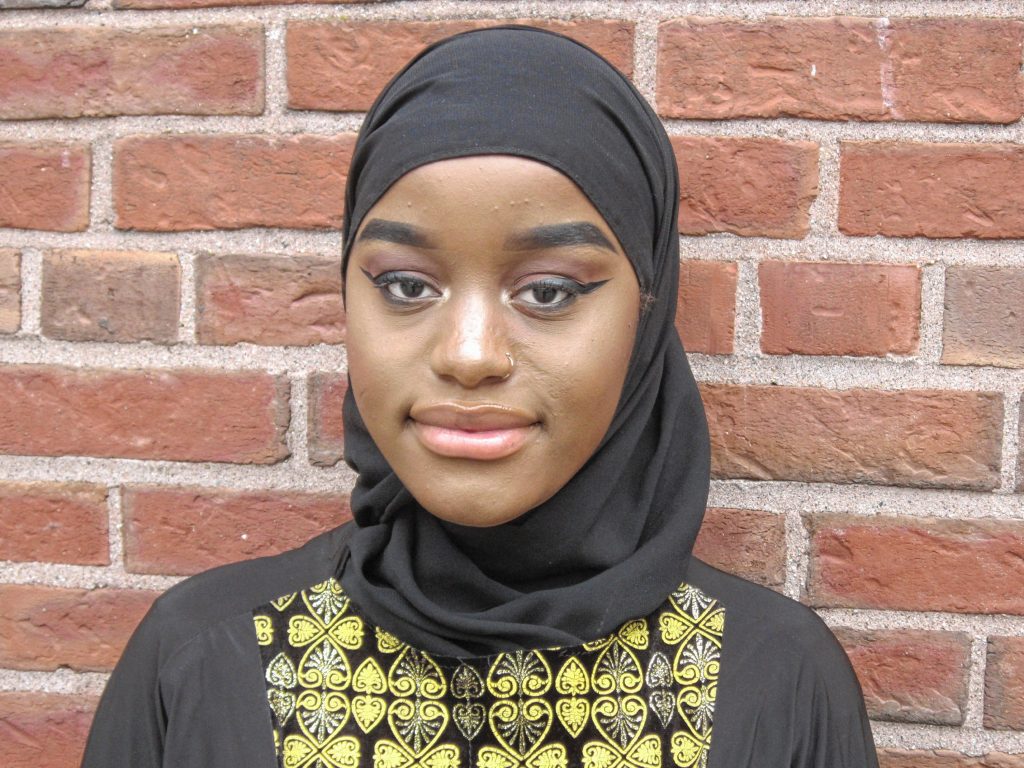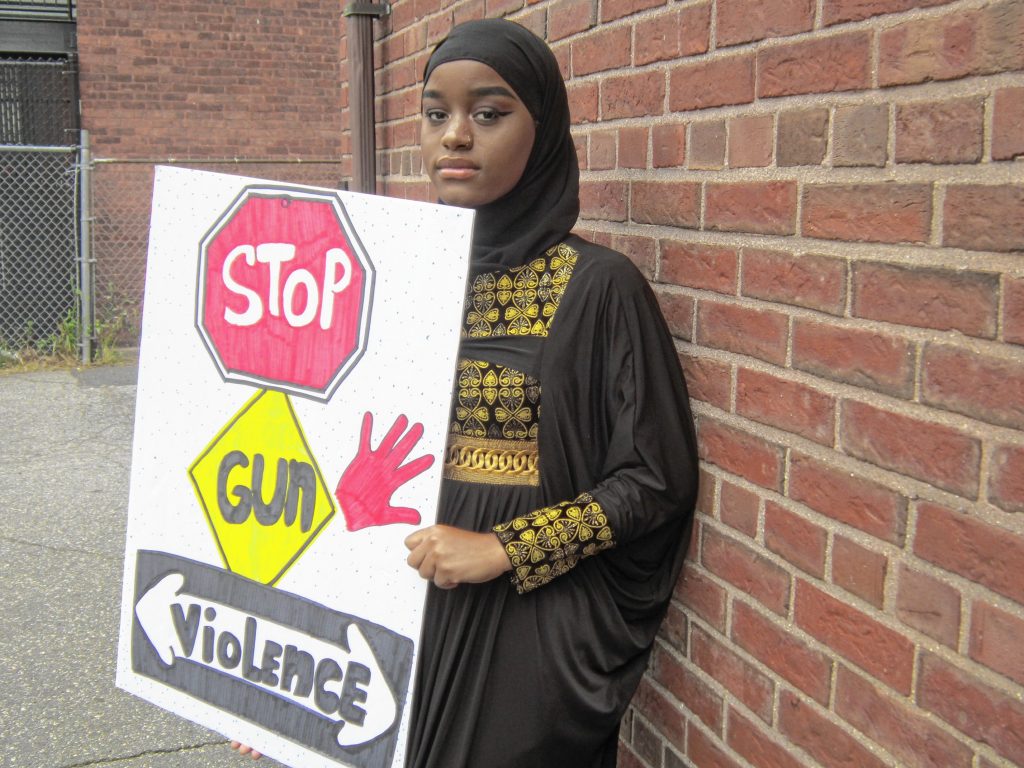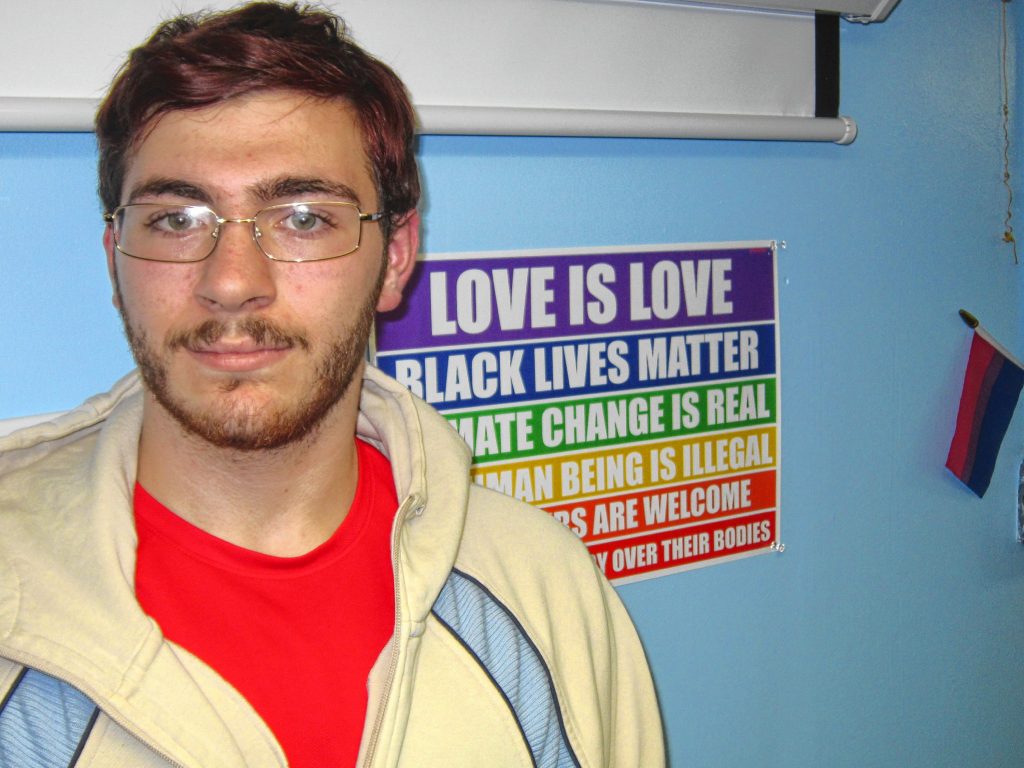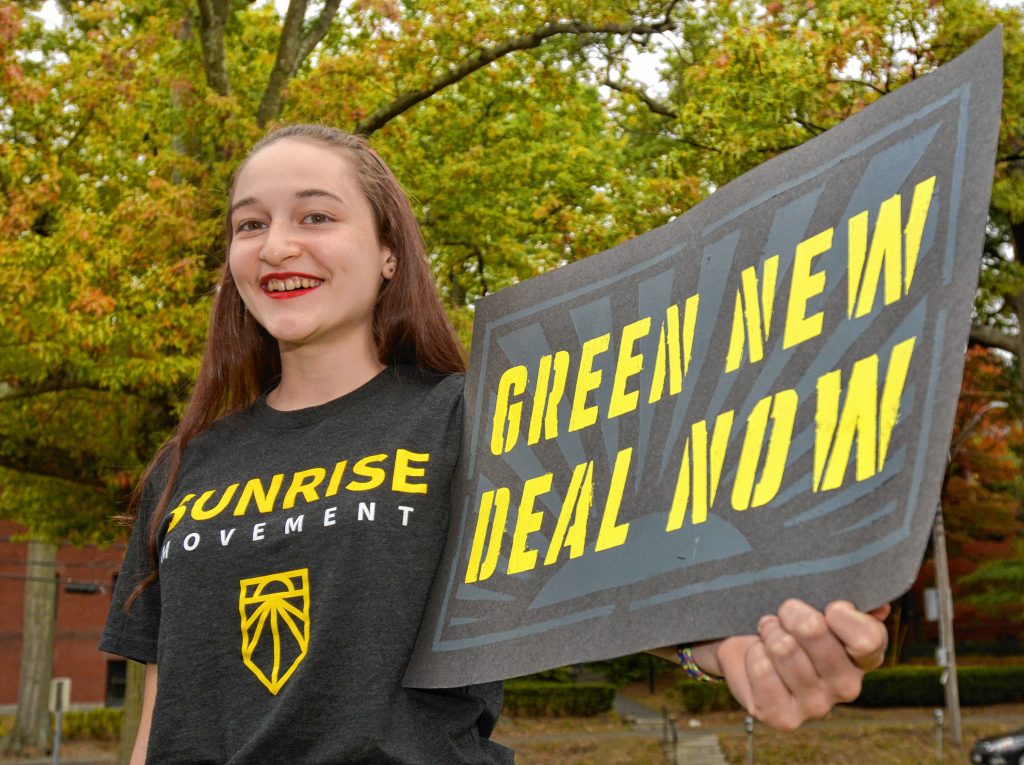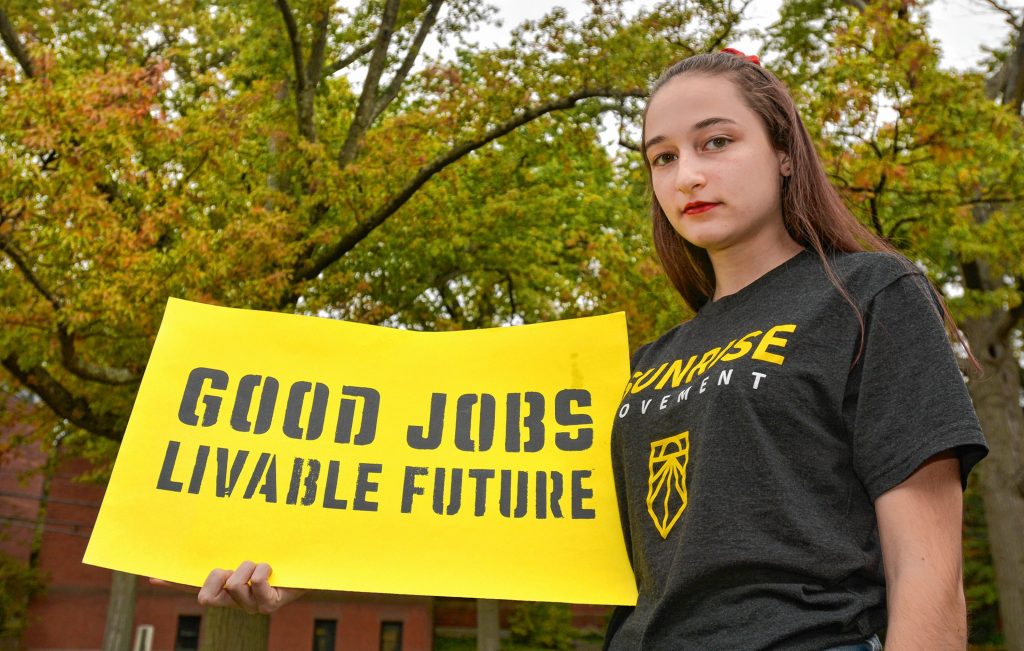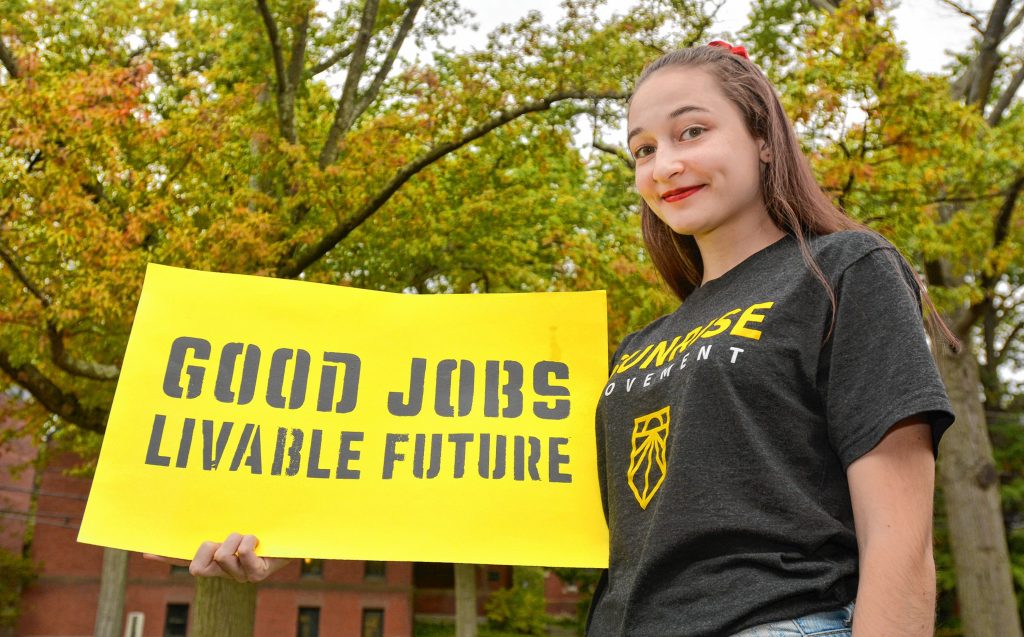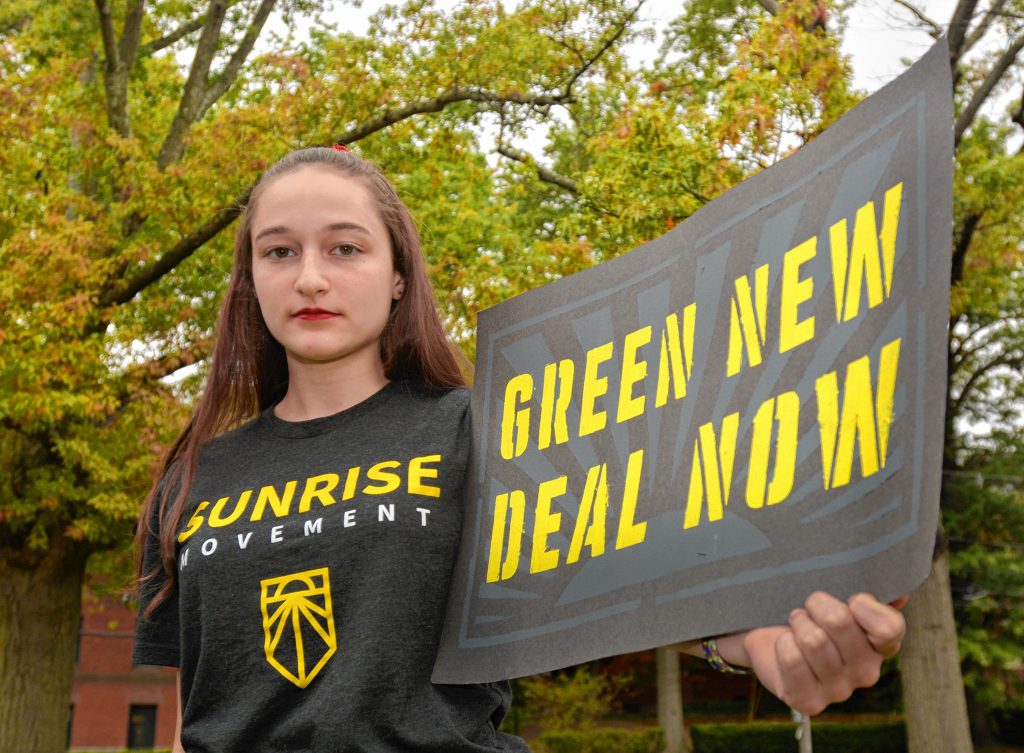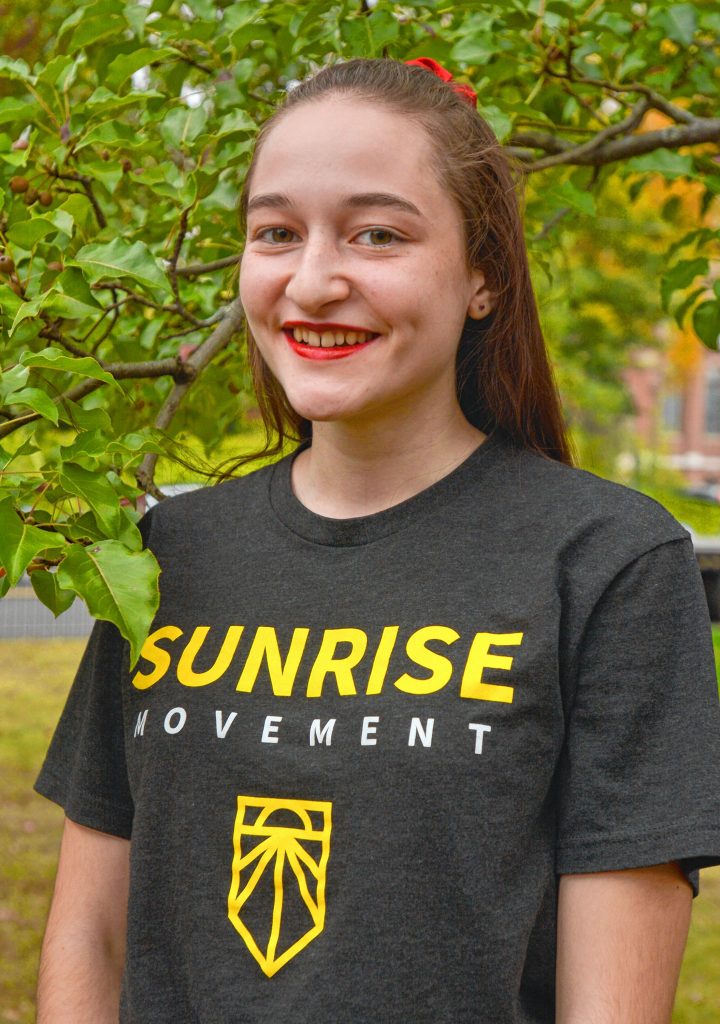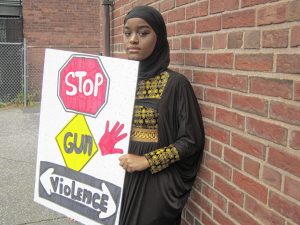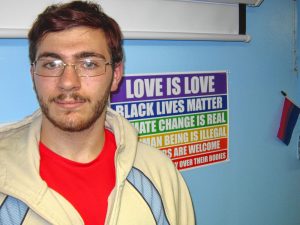With Swedish climate activist Greta Thunberg testifying before the United States Congress in September and teenagers from Stoneman Douglas High School in Parkland, Florida, becoming leaders advocating for more rigid gun control laws following the 2018 shooting in their school, youth activists are as present as ever.
Here in the Pioneer Valley is no exception. There are many teen and young adult activists seeking to promote change in their communities and the world. We wanted to highlight a few examples of the many young activists committed to causes, whether that’s speaking out against gun violence, as an advocate for local homeless youth, or staging protests in the fight against climate change.
A conversation on gun violence
Maana Daud, a 19-year-old Springfield resident and member of the Pioneer Valley Project, became involved with protesting gun violence this past February. The reason she became involved was personal — her 20-year-old cousin from the state of Washington was killed by someone wielding a handgun.
“The same way a bullet hit him, it could have hit any of my siblings,” said Daud, who has five brothers and three sisters ranging in age from 1 to 21.
She’s taken part in two protests across the street from the Springfield headquarters of gun manufacturer Smith & Wesson, in which teens, activists, and religious leaders have joined together to call for a sitdown conversation with the company’s CEO, P. James Debney. They want to discuss the gun violence epidemic, whether that’s public shootings or gun violence in cities across the country like Springfield.
“I feel like if you have the power to sell these guns, be the solution,” she added.
The Pioneer Valley Project has staged protests more than half a dozen times during the past year across from Smith & Wesson’s Roosevelt Avenue headquarters, but have yet to receive a response from the company or Debney.
“We’re only coming to you because we know you manufacture these guns,” Daud said of Debney. “We’re not trying to take anyone’s guns away. We’re not saying, ‘You can’t have a gun.’ But have a seat with us and hear what we’re trying to say. Try to hear our stories that we have to tell you. Imagine those who are impacted by the guns … You make money off guns, but the guns cause a family to pay for funeral costs.”
For Daud, all gun violence is part of the gun violence epidemic, not just mass shootings that make the national news.
“Even though it wasn’t somebody in the classroom, they’re the same loss taken … I think it is the same problem because even though a mass shooting is bigger, it’s no different. A shooting is a shooting. The same way that families of a mass shooting are hurting, a single family is hurting as well.”
Daud was born in the Dadaab Refugee Complex in Kenya after her family fled their home country of Somalia during the Somali Civil War in 1990. She and her family emigrated to the United States on June 20, 2004, when she was four years old, and moved to Springfield.
“I noticed I was the only one wearing a hijab and many of my classmates spoke Spanish,” she noted about her first years of school in Springfield. “I was sitting there trying to learn English … And the thing is they were so welcoming. No one looked at me like, ‘Oh, the girl that just came from Africa.’”
Daud also recently graduated this year from the High School of Commerce in Springfield and plans to attend Springfield Technical Community College’s nursing program as a pathway to become a neurosurgeon. Growing up, she had several surgeries, one of which was for hyperthyroidism when she was in the seventh grade.
“That pushed me to continue on my path to becoming a doctor,” she explained.
As a first generation American, Daud said sometimes it’s a balancing act between her Somali Bantu ethnic heritage and her life as a typical American teenager. But her cultural roots are something she takes pride in, specifically through her involvement with the Springfield-based Somali Bantu Community organization, which seeks to bring more awareness about the cultural group in the city. She serves as a board member with the group.
“When you go home you’re this and when you go to school you’re this, but as I grew up, I learned to bring my own culture within the American culture because I think ethnic cities are important,” Daud said.
Daud was also involved with the Pioneer Valley Project’s Youth Voices United mayoral candidates forum at Springfield Central High on Sept. 5, which saw newcomers Yolanda Cancel and Jeffery Donnelly (who was eliminated from the ballot during the Sept. 10 primary) answering questions from youth activists in the city. However, longtime incumbent Mayor Domenic Sarno was absent from the event and in his stead was an empty chair where the pre-recorded sounds of crickets played whenever Sarno’s empty chair was asked a question.
During the forum, Daud said she asked mayoral candidates Cancel and Donnelly what they would do to make sure Springfield is a city where “children can play in their backyards without hearing gunshots,” which allowed her to speak with people running for political office about the issue of gun violence.
“Youth were actually being heard from the adults and we actually got feedback from the adults on the questions we asked,” she added. “We were empowered. Youth power was being shown.”
Fighting for climate justice
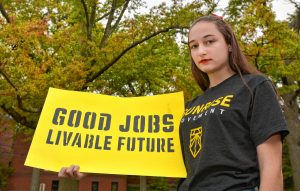
Kala Garrido, a Hampshire Regional High School student who is involved in the climate activist group Sunrise Northampton, holds a sign at Forbes Library, Wednesday, Oct. 16, 2019. Jerrey Roberts photo
Kala Garrido is a 15-year-old sophomore at Hampshire Regional High School from Haydenville, who was one of two teen activists in the Valley who organized a western Massachusetts youth strike trip to Boston during the Sept. 20 Youth Climate Strike. The group of organizers, all under 20 years old, rented 13 buses to join protest actions outside Boston City Hall.
For Garrido, who is a member of Sunrise Northampton, a youth-led organization of activists under 35 years old fighting against climate change, our warming planet isn’t an issue that she thinks people should be passive about.
“Despite the fact that we live in a liberal area, there’s so many passive supporters,” Garrido noted. “There’s so many people who support climate justice reform, but they’re not active about it. And that’s a common theme in really liberal areas. I love it here because there’s so much support for the movement and we’re trying to grow. Even then, there’s areas that have way more active supporters even though they may not be in the most liberal area. They’re even more encouraged to fight back.”
She thinks it’s only common sense that people stand up and create change through direct action while the entire world is in the midst of mass extinction and faces an uncertain warming future where human life is uncertain.
“Climate change is an integral part of all of our lives because it affects our Earth and where we live,” she noted. “It affects literally everything. And there’s so much intersectionality between other issues and climate change. It seriously affects racial justice.”
Garrido said lower income communities of color bear much of the burden from environmental pollution and climate change.
“People of color are disproportionately affected by the climate crisis because fossil fuel companies, specifically fossil fuel executives, target communities of color because they have the least political power to fight back,” she explained.
Green New Deal initiatives are part of the solution in creating a just future for all communities as the United States moves towards 100 percent renewable energy, she said.
In Massachusetts, Garrido thinks one of the most promising bills is “An act to promote green infrastructure and reduce carbon emissions (H2810)” filed by State Rep. Jennifer Bensen (D-Lunenburg), which would create a $20 per ton tax on carbon produced by companies in the state. The tax would increase by a rate of $5 every year until it reaches $40 per ton of carbon, according to the bill.
Thirty percent of those carbon taxes would support a Green Infrastructure Fund, which would create “investments in clean energy, clean transportation, and resiliency to local impacts of climate change.” Those would include investments in public transit, electric vehicles, electric vehicle infrastructure, and other modes of clean transportation; expansion of in-state renewable energy systems; energy efficiency and renewable energy investments in housing, municipal infrastructure, and public school buildings, and loan programs for small business climate resiliency, renewable energy, and efficiency upgrades, according to the bill, which was referred to the committee on Telecommunications, Utilities and Energy in January.
The remaining 70 percent of the tax would be placed in a Greenhouse gas pollution charges fund with 75 percent of that fund going towards a household fund for Massachusetts residents and the remaining 25 percent towards and employers’ fund.
Garrido said she believes the bill would allow “those who are the lowest income to get the most back,” while “those with the most impact get the least back.” Right now, the Sunrise Movement is lobbying for the bill to receive a hearing.
Before this past summer, Garrido wouldn’t have called herself an activist. Becoming a member of the strike leadership team for the Youth Strike in September was an awakening moment for her. Prior to that action, she’d only participated in the 2017 Women’s March, which showed her “how powerful people power is.”
One of Garrido’s inspirations is 16-year-old Swedish climate activist Greta Thunberg and, like her, Garrido thinks adults who look to young people to solve the climate crisis aren’t being realistic, adding that “you can’t just step away.” She thinks everyone needs to advocate against fossil fuels and a more sustainable future.
“It’s not like that because I’m a part of these movements that I don’t get discouraged,” she added. “I get discouraged often and it can be really hard to keep this hope when it just feels so hopeless … It feels like sometimes I have no power because I can’t vote, I can’t run for office. But having an outlet to speak out through striking and being able to speak my voice makes me feel like maybe I’m not powerless.”
She also thinks that unwarranted blame is often placed on individual people for contributing to climate change, rather than major corporations who are releasing most of the greenhouse gases.
“There’s subsidies on a lot of these items that make it so the things that are not good for the environment are more cheap,” she added. “And it’s hard because then it turns into an elitist thing. ‘Oh, be vegan.’ Some people might not be able to afford that.”
Garrido’s dream is to run for president of the United States, an ambition she’s had since being a young child. But whether that dream is attainable or not, she hopes to either work in politics or in education as a teacher or school psychologist.
“It’s not easy to be a teen activist when you’re also dealing with high school,” she added. “I also want to do these things that I want to do. But also, there’s this climate crisis that threatens our existence.”
The next youth climate strike for Western Massachusetts organizers will be taking place in downtown Springfield on Dec. 6.
Activism through lived experiences
Timothy Rivers of Greenfield, who turned 20 earlier this month, knows what it’s like to be without a home. He was homeless with his family off and on as a teen. He, his mother and her best friend, and his now 22-year-old brother lived in a car for weeks at a time and in motels while trying to secure more permanent housing over a period of years.
At one point, they were living with his mother’s best friend in Colrain in August 2016. But the home where they were all living was falling apart. They had to redo the electrical themselves and there was no plumbing in the building. He was 17 years old that year, and a wind storm left the house uninhabitable and they were left homeless.
“It was better than the car and at least we had electricity,” Rivers explained, adding that oftentimes he would awaken to frost on the windows clinging to his head while sleeping in a car.
The family stayed in a motel together before moving south to Florida in March 2017. The trailer they were renting was located near a swamp and during hurricane season they were left homeless again.
“We got a call from the landlord and, ‘Thank God, you guys are okay. I don’t know how to tell you this, but the trailer is underground at the moment.’ We lost the house, got into a motel, left the motel for a pretty much abandoned building, went down to Florida and had [the trailer] swallowed by the Earth itself,” he added.
Rivers and his family moved back up north to Franklin County in August 2017 and he turned 18 years old living at a Red Roof Inn hotel in South Deerfield in October of the same year. But in February 2018, Rivers was able to enter a program with Greenfield-based nonprofit DIAL/SELF, which provides homeless teens in Greenfield, Northampton, and Orange with housing, where he has been living ever since.
Since this year, Rivers has become an advocate for youth homeless in Franklin County through nonprofit Community Action’s Youth Action Board, through which Rivers has a voting voice to help end youth homelessness.
“It’s all good and well to say the cat’s meowing because it wants water,” he added. “The cat wants to go outside, but we don’t understand it because we don’t have it’s perspective. Give the cat the ability to talk and suddenly we know what it wants. And comparing the homeless to animals is probably not beneficial towards breaking any stigma, but that’s how we’re treated often.”
The community of Greenfield was confronted with issues surrounding homelessness in the summer of 2018 when as many as 20 people began camping on the Greenfield Town Common. After a month and a half, the encampment was closed in August 2018 by the Greenfield Board of Health, which issued a cease and desist order, and sparked protests near the common.
And this January, 50-year-old Kathleen Grady died of carbon monoxide poisoning and possible hypothermia alongside her partner Clayton “Aaron” Wheeler Jr., 51, (who also died of carbon monoxide poisoning), while sleeping overnight in a tent during single-digit temperatures behind a McDonald’s on the Mohawk Trail. The deaths of the couple also created more dialogue and concerns in the community regarding homelessness.
On Aug. 29, Community Action Pioneer Valley was awarded a $1.9 million grant from the U.S Department of Housing and Urban Development in efforts to end youth homelessness, according to the Greenfield Recorder. Greenfield and other communities in the Valley such as Springfield are now working with youth action boards, child welfare agencies and other community partners to create plans that reduce, and ultimately end youth homelessness.
Community Action also became the lead agency this past February of the Three County Continuum of Care (COC), a program across the three counties of Western Massachusetts that seeks to end homelessness. In spring 2020, local area organizations will be able to apply to submit projects through the COC, which more than doubled its funding of $1.8 million with the $1.9 million two-year federal grant.
Rivers, who identifies as pansexual, said LGBTQ and gender sexual minorities as well as youth of color are disproportionately at a higher risk of homelessness.
“That’s again why a youth voice is so impactful because a lot of the issues we’re having are from an antiquated system and old people not wanting to change,” he added.
He added that he didn’t seek out to become a youth activist. Initially, he joined Community Action’s Youth program to attain volunteer hours required as part of his teen housing program. But his perspective changed when he discovered his voice would be heard.
“It’s been almost six months,” he added. “I haven’t been able to attend every meeting, but I’ve come close … You don’t think it’s going to happen, but you get recognized by other people who see your work and one thing leads to another and you’re a voting member of a Three County Continuum of Care speaking on behalf of the Youth Action Board, which itself represents youth who’ve experienced some degree of homelessness whether that’s couch surfing or staying with a friend or living in your car or in the shelters or physically on the streets.”
He thinks most communities (Greenfield included) don’t treat people experiencing homelessness with respect or with compassion. Oftentimes park benches are divided by seats to prevent people from sleeping on them and other punitive architecture to make life difficult for homeless people.
“Frankly, as a community, we don’t care enough,” he explained. “That’s a sad truth … We’re a very narcissistic society that’s destroying itself.”
Rivers is also in a program to become a certified nursing assistant after having previous jobs as a personal care assistant, but his plans for the future are to work his way up the ladder in the Massachusetts Department of Children & Families to create change from within by fighting for more resources and programs for homeless youth.
Chris Goudreau can be reached at cgoudreau@valleyadvocate.com.

